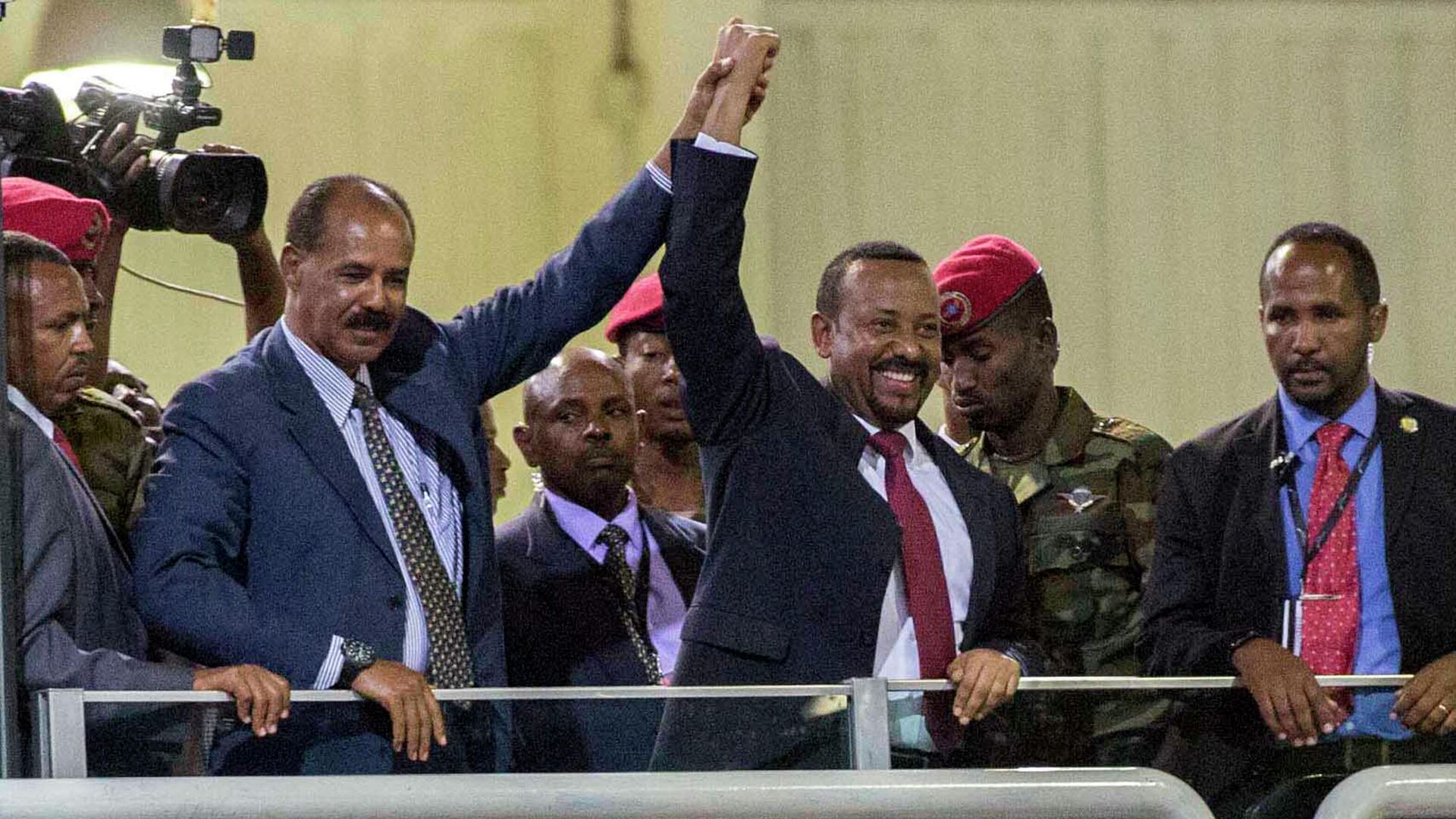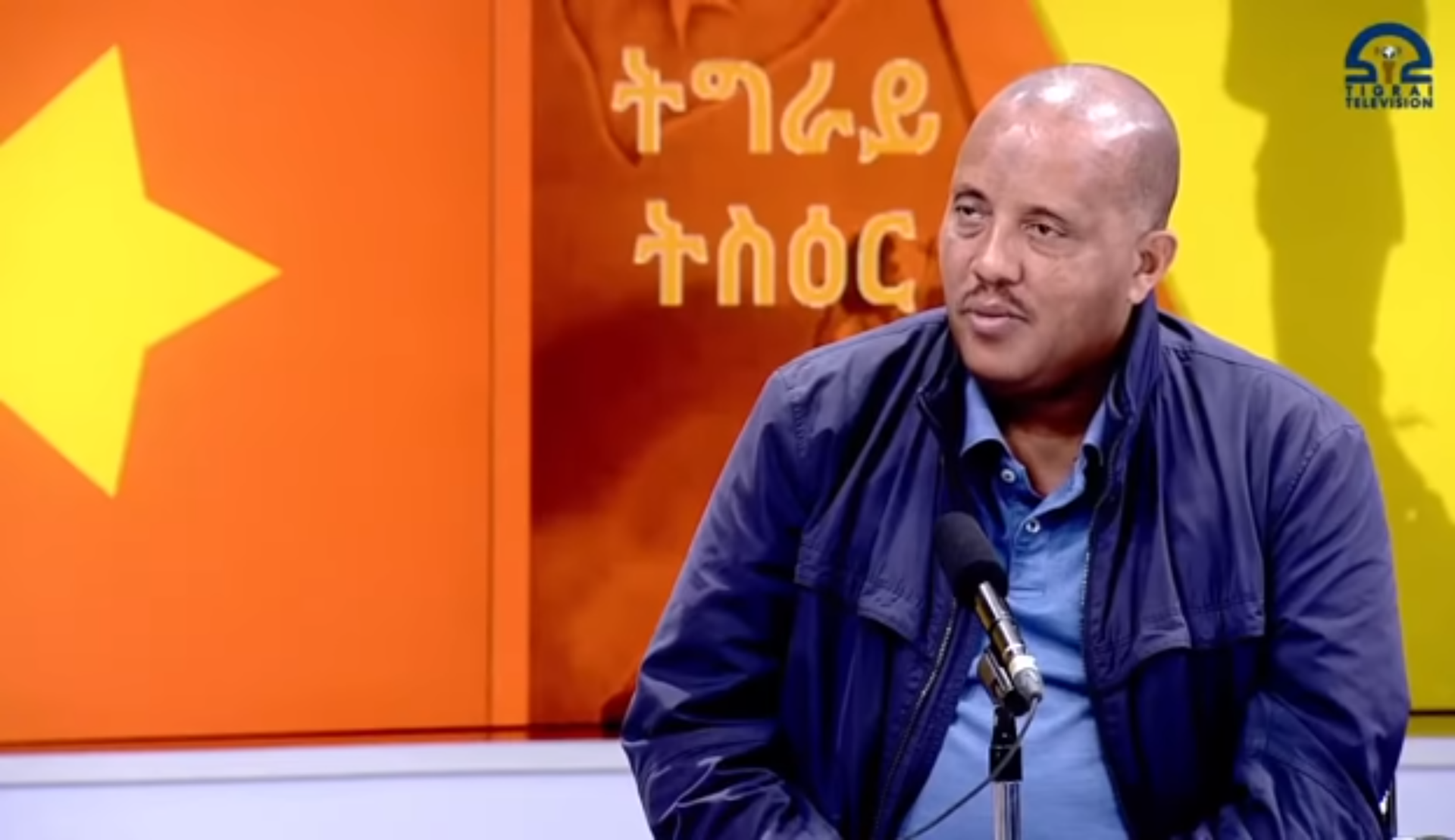NY Times Hit Piece Confirms US Seeks to Demonize Ethiopia's Abiy for Peace With Eritrea, Experts Say
01:10 GMT 17.12.2021 (Updated: 11:35 GMT 23.11.2022)

© AP Photo / Mulugeta Ayene
Subscribe
A recent New York Times story alleging to reveal the origins of the conflict in Ethiopia is riddled with falsehoods intended to further demonize the government of Prime Minister Abiy Ahmed and conceal the crimes of the Tigray People’s Liberation Front (TPLF), experts told Sputnik.
Disinformation by Western media about the Ethiopian conflict is nothing new, becoming highly visible parts of the #NoMore protest movement by the Ethiopian diaspora. Their demonstrations have called attention to the New York Times in particular, where journalist Declan Walsh, the paper’s Chief Africa Correspondent and author of the Wednesday article about Abiy, in July infamously referred to photos of Tigrayan child soldiers as “highly motivated young recruits.”
Walsh’s latest article, titled “The Nobel Peace Prize That Paved the Way for War,” claims to peel back the edifice of Abiy’s international image as a peacemaker and to reveal that the Nobel Peace Prize winner had long planned the war in Tigray with his partner in crime, Eritrean President Isaias Afwerki.
“In fact, it was a war of choice for Mr. Abiy - one with wheels set in motion even before the Nobel Peace Prize in 2019 that turned him, for a time, into a global icon of nonviolence,” Walsh writes.
“The Nobel win stemmed largely from the unlikely peace deal Mr. Abiy struck with Isaias Afwerki, the authoritarian leader of Eritrea, within months of coming to power in 2018. That pact ended two decades of hostility and war between the neighboring rivals, and inspired lofty hopes for a transformed region,” Walsh added. “Instead, the Nobel emboldened Mr. Abiy and Mr. Isaias to secretly plot a course for war against their mutual foes in Tigray, according to current and former Ethiopian officials who spoke on the condition of anonymity to avoid reprisals or protect family members inside Ethiopia.”
According to Walsh, Abiy, an ethnic Oromo, “never felt fully accepted by Tigrayans and suffered numerous humiliations” during his years in the TPLF-led government, for which he sought revenge as part of a mixture of paranoia and inferiority complex. Isaias, who Walsh says “had a long and bitter grudge” against the TPLF due to the 1998-2000 war that killed at least 120,000 Ethiopians and Eritreans, became a natural ally after the two signed a peace treaty to end that war in 2018.
A Bridge Too Far: Peace With Eritrea
Eritrea, which broke away from Ethiopia in 1991 after a decades-long struggle for independence and sits on the Red Sea, is the only country in Africa not to have a relationship with US Africa Command (USAFRICOM). However, Washington has long sought to isolate Eritrea on the world stage, ever since the TPLF-led Ethiopian government became a major US War on Terror partner in the early 2000s and the Eritrea-Ethiopia Boundary Commission (EEBC), set up to establish the new border between the two nations, gave the key city of Badme to Eritrea - a move to which Addis objected.
“Instead of putting pressure on the TPLF regime to accept the boundary demarcation ruling of the EEBC, the US further demonized Eritrea and imposed sanctions on it in 2009,” Elias Amare, independent journalist, researcher and the editor of Horn of Africa TV, told Sputnik on Thursday.
“The trumped-up charges for the sanctions were that Eritrea supported the Al-Shabaab terrorists of Somalia, an utterly bogus charge, because Eritrea was itself the victim of jihadi terrorist proxy groups that were being financed and supported by the TPLF regime of Ethiopia,” he added. “These unjust sanctions that were imposed on Eritrea at the UN Security Council were finally lifted in November of 2018 once peace was achieved with Ethiopia.”
“So, all along, the TPLF regime and its patrons in Washington have been against peace between Eritrea and Ethiopia,” Amare said. Indeed, comments quoted by Walsh in his Wednesday article reflect just such an attitude.
“The West needs to make up for its mistakes in Ethiopia,” Alex Rondos, formerly the European Union’s top diplomat in the Horn of Africa, told the Times. “It misjudged Abiy. It empowered Isaias. Now the issue is whether a country of 110 million people can be prevented from unraveling.”
Washington’s Policeman
“The only issue is regional alignment and not complying enough to a regional set of policies isolating Eritrea, plus troop movement in the region, instead of continuing the occupation in Somalia, Sudan, etc,” Filmon Zerai, writer, independent analyst and an organizing member at Horn of Africa Pan-Africans for Liberation & Solidarity, told Sputnik.
“Outside of the position on Eritrea and conflict with the TPLF, he [Abiy] is the best leader Washington ‘needs’ internally,” Zerai added, noting that Abiy’s government has continued its close military cooperation with US Africa Command begun by the previous TPLF government. US Agency for International Development (USAID) chief Samantha Power said much the same on CNN last month, even as her agency withholds $272 million in food aid for the country.
He cautioned that “while it's important to highlight Abiy’s neoliberal leanings and disregard for oppressed nationalities in Ethiopia, the author’s only issue seems to be his closeness with Eritrea.”
“If Ethiopia does not terrorize its neighbors at the behest of Western powers, it must be terrorized! Since TPLF is willing to do the required, it is not surprising it is preferred by those who want the people of the Horn to be at each other’s throats,” Mustafa Omer, president of Ethiopia’s Somali State, wrote on Facebook in response to comments by French analyst Rene Lefort, who argued the US wants a strong Ethiopia that can be “the policeman of the Horn.”
“Peace between Ethiopia, Eritrea and Somalia is good for the region. Most of the regions’ wars were fought between these countries. If they decide to make peace, why get nervous?”
‘A War of Choice’?
Walsh’s article obscures basic facts about the tension between Abiy’s government and the TPLF between 2018 and 2020, experts said, giving the false impression that both the tension and the escalation were solely Abiy’s fault, making the conflict “a war of choice,” as he put it.
However, despite his framing of the very real sequence of events - that the TPLF sneak-attacked Ethiopian National Defense Force (ENDF) on the night of November 3, 2020, killing an estimated 6,000 soldiers - as nothing more than “an article of faith for Mr. Abiy and his supporters,” Walsh nonetheless admits at the end of his article that on that evening, “Tigrayan forces attacked an Ethiopian military base, calling it a pre-emptive strike.”
The 3rd para in this NYT article https://t.co/jTMpq8Hnjw leaves the impression (“Abiy insists…”) that the idea that TPLF attacked first is a fiction. Not until para 54 (!) do we learn that is exactly what happened. Incidentally the letters “TPLF” do not appear anywhere. pic.twitter.com/z17zwpPPVf
— 🇵🇸Left 👁 on the News (@leftiblog) December 15, 2021
Tigrayan journalist Hermela Aregawi wrote on Thursday that Walsh’s article “is racist to the bone, neocolonial in its approach and spits on the basic tenets of democracy.”
“There is evidence to show that it’s the TPLF who have been mobilizing ethnic Tigrayans using the lie that the country is against them, when the country was against the greedy, brutal TPLF leadership. For the last few years, the TPLF rejected negotiation efforts by the federal government of Ethiopia, unwilling to take any offer less than ruling the country again. They would not let Prime Minister Abiy Ahmed balance out the Army, which had been dominated by ethnic Tigrayans and other pro-TPLF agents for nearly three decades.”
“The TPLF ruled the country for 27 years after its Western-backed overthrow of the then communist government, the Derg. Since, it rigged elections and killed protesters who spoke out as a matter of routine. When the TPLF was sidelined in 2018 through the struggle of the people and years of protests, it continued to operate as though it was still running the country and refused to let Abiy Ahmed do the job he was appointed, and later elected by the people to do, run the country as he and his parliament saw fit.”
Amare added that Abiy had been “extremely flexible and placating towards the TPLF, traveling several times to Tigray talking openly with the people and pleading with the leaders of TPLF to pursue the path of peace … Contrary to this, TPLF started to prepare for war, raising nearly a quarter of a million special forces, militias and irregular armed vigilantes and continued its belligerent stance beating the war drums.”
Amare explained that Abiy dismantled the Ethiopian People's Revolutionary Democratic Front (EPRDF), which the scholar referred to as an “ethnic-based trojan horse umbrella organization by which the TPLF imposed its minority rule,” and replaced it with a stronger, more centralized Prosperity Party “which aimed to eventually end to toxic ethnic politics that TPLF introduced and imposed in Ethiopia.”
“This, plus the peace with Eritrea, was a death knell to TPLF. And thus, once ousted from power in 2018, the TPLF unleashed inter-ethnic and inter-religious conflicts to make Ethiopia ungovernable. Having failed in all this chaos strategy, it resorted to its final gambit of open warfare against the central government, believing that it had the necessary army and war arsenal to defeat [Prime Minister Abiy] and march all the way to Addis Ababa to bring about regime change,” he added.

Tigray People's Liberation Front (TPLF) spokesperson Getachew Reda in a December 8, 2021, interview with Ethiopia's Tigray TV.
Indeed, as TPLF spokesperson Getachew Reda recently said in separate interviews on Tigray TV and Dimtsi Weyane, it was clear to the rebel group that the Americans intended for them to enter Addis. Further, a video from a secretive meeting between Berhane Ghebre-Christos, a TPLF-era foreign minister, and several US and European diplomats last month revealed American approval of the TPLF’s rapid military gains and for a potential “transition government” to replace Abiy.
All the while, however, the US has maintained a public position of neutrality on the conflict, calling on all sides to adopt an immediate ceasefire and sanctioning both Abiy’s and Isaias’ governments for actions “that have contributed to the crisis and conflict, which have undermined the stability and integrity of the Ethiopian state." No parallel measures have been taken against the TPLF, although early in the conflict the then-Trump administration did admonish the group for its attacks on both the ENDF and bombarding the Eritrean capital of Asmara.
Those gains have now largely been reversed, as a massive ENDF counteroffensive has pushed the TPLF back by nearly 100 kilometers, recapturing dozens of towns and totally pushing them out of Afar. In the liberated areas, numerous reports have emerged of TPLF brutalities, including executions of civilians and looting of hospitals and UN World Food Program warehouses.

